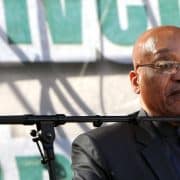|
Getting your Trinity Audio player ready...
|
The Constitutional Court has ruled that President Jacob Zuma failed to uphold his duties as prescribed by the Constitution in dealing with the findings of Public Protector Thuli Madonsela with regard to Nkandla. Chief Justice Mogoeng Mogoeng said Zuma “failed to defend, uphold and protect the Constitution of the land” in the matter and his failure to comply to the findings is inconsistent with obligations towards the Constitution. The case was brought by the EFF and DA, with Corruption Watch as an amicus curae.
The court was to determine if the recommendations of Madonsela for Zuma to reimburse the state for the money paid for non-security features at his private home in KwaZulu-Natal. Corruption Watch applauds the judgment, which finds that Madonsela’s findings in this matter are binding and can only be set aside upon judicial review. In other words, Zuma could only have ignored the findings if they had been set aside by a court of law.
The two opposition parties also took parliamentary Speaker Baleka Mbete and police minister Nathi Nhleko to court, applying for an order clarifying the powers of the Public Protector and compelling Zuma to repay some of the money that was spent on non-security items, among them the swimming pool and cattle kraal.
The judgment reinforces the provision in the Constitution for all organs of state to protect and promote the chapter 9 institutions. This includes taking positive steps to safeguard the efficacy of the Public Protector’s rulings, as well as to defend the Public Protector’s principal role of protecting against state maladministration.
‘We are naturally delighted that the Court has decided that the findings of the Public Protector are binding, an outcome that we have consistently contended for in both the Supreme Court of Appeal and the Constitutional Court,” said Corruption Watch executive director David Lewis. “However, we also contend that, the legal position aside, the president has always been under an ethical obligation to defend and promote the work of Chapter 9 institutions like the Public Protector, an obligation that he and senior ministers of state have long flouted.”
The judgment also calls for an independent body to quantify the terms of the remedial action, even if that body is within the state.
Adding its voice to the case
On 9 March, Corruption Watch as amicus curiae (friend of the court) addressed the Constitutional Court on the status and scope of the Public Protector’s remedial powers and how organs of state are required to respond to the Public Protector’s remedial action, subject only to a judicial review. The main focus was in respect of compliance by state officials and the president with the Public Protector’s remedial action, as an important factor in the fight against corruption.
The judgment validates Corruption Watch’s submission before the court.
The day before, on 8 March, the organisation launched its Bua Mzansi campaign, a country-wide mobilisation initiative to get the public involved in the selection of the next public protector. The incumbent, Thuli Madonsela, finishes her non-renewable seven-year term of office towards the end of this year. The public’s right to participate in the selection is written in law, and the Bua Mzansi campaign aims to ensure that Madonsela’s successor is not chosen in a one-sided process.
With the Constitutional Court now clarifying the powers of the Public Protector once and for all, Corruption Watch expects the president and other ministers to comply with the judgment in the interests of the rule of law in South Africa. With the relationship between President Zuma and the Gupta family under the spotlight, and soon to be the subject of a Public Protector investigation, it is crucial that the court’s findings are respected and upheld.
‘The court’s findings underline the imperative to ensure that the next public protector is an equally robust defender of the public against state abuse and maladministration,” Lewis said.







